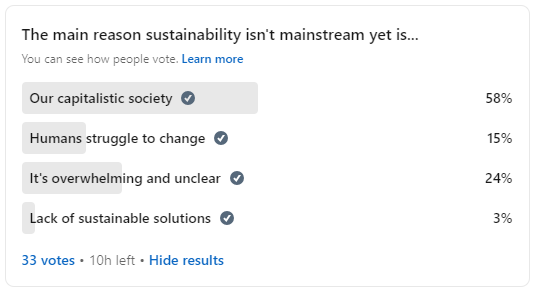Why is sustainability not mainstream yet?
I asked this question in a poll on LinkedIn this past week and, given four choices, the answers were (predictably for my sustainability-aware connections):

Now, you'll know this is an oversimplification because the reasons are all interconnected but thinking about it, they are all going back to one: human nature.
Our human brain has evolved to preserve the status quo as much as possible. We want to keep going as a species, so we fear changes, and anything new or different is met instinctively with diffidence.
We also prioritise what we think is an immediate threat and tend not to pay attention to long-term threats, simply because we can't really imagine the exact consequences for us.
We tend to protect and look after ourselves and our immediate entourage, and that means greed and exploitation of what's around us for our own benefit and preservation.
Knowing all of the above might make it easier to understand why sustainability has not gone mainstream yet:
- Lots of it is pioneering stuff - new and unproven
- It implies a long-term view that many of us just can't picture in our heads
- The threat is for many too far (geographically and in time) to be taken seriously into consideration when compared to day-to-day firefighting
- Change needs to be so much more advantageous than the status quo (twice as much, in fact, according to research) for people to switch, and often sustainability cannot immediately guarantee that.
How can you use this information to your advantage?
In your communication and everyday sustainability efforts, you can focus on presenting sustainability not as the ethical thing to do (as we have seen in previous newsletters, that doesn't resonate with everyone), but as the most common sense, responsible option.
Most importantly, make it easier than the unsustainable option to adopt. An example comes to mind: celebrity chef Jamie Oliver, years ago, showed in one of his TV series how making a healthy and delicious curry was quicker than ordering a takeaway from a local Indian place and waiting for it to be delivered.
Some ideas:
- Create templates and step-by-step guides
- Offer one-to-one support and training
- Showcase the numerous immediate benefits, especially economic
- Create certainty by showing how others have successfully adopted it
- Make an emotional connection with it: what does your audience care about? Can sustainability help your audience preserve and enhance that, e.g. their family business longevity or the relationship with their community?
This article was originally written for the Green Gorilla weekly newsletter. If you liked it, subscribe to receive more articles like this and learn how to communicate sustainability better, how to be more productive without selling your soul to the work devil, and how to make an impact in the world. Here is the link: https://newsletter.thegreengorilla.co.uk/
